1
Followers
2
Following
random library adventures
Intermittent reviews & commentary. Preferred genres: YA; contemporary lit; sci-fi/fantasy; comic books
Currently reading
One Hundred and Forty Five Stories in a Small Box: Hard to Admit and Harder to Escape, How the Water Feels to the Fishes, and Minor Robberies
Miss Peregrine's Home for Peculiar Children
The Best American Short Stories 2009
Jonathan Strange & Mr Norrell
The Graveyard Book
Inkspell
Let's Explore Diabetes with Owls
The Quick-Change Artist
Ash
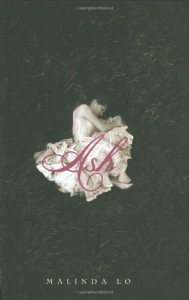 Greatly enjoyed this book. Lo's writing is evocative, lush and lyrical, and I felt for her characters. Her prose is particularly strong when describing the lands of faerie and the wonder/terror of her protagonist's experiences with them. I liked the romance between Aisling and Kaisa, but I did feel like the book was maybe a little too thin for the scope of the story it was telling. Still, I don't regret buying it, and I'd recommend it to anyone--especially to those who wish we had more serious female / female stories on the market, whether romantic or not.
Greatly enjoyed this book. Lo's writing is evocative, lush and lyrical, and I felt for her characters. Her prose is particularly strong when describing the lands of faerie and the wonder/terror of her protagonist's experiences with them. I liked the romance between Aisling and Kaisa, but I did feel like the book was maybe a little too thin for the scope of the story it was telling. Still, I don't regret buying it, and I'd recommend it to anyone--especially to those who wish we had more serious female / female stories on the market, whether romantic or not.
Frostbite (Vampire Academy, Book 2)
 I started reading this after I watched the MTV VMAs, because doing so made me feel like a teenager. This book has so far only perpetuated that feeling.
I started reading this after I watched the MTV VMAs, because doing so made me feel like a teenager. This book has so far only perpetuated that feeling.Didn't finish it, I'm afraid. Couldn't sustain my interest.
House of Many Ways
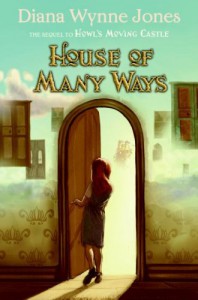 I read this at lightning speed after I bought it, and I did enjoy it immensely--but even though it's touted as a direct sequel to Howl's Moving Castle, Howl & Sophie figure in about as prominently as they did in the other sort-of-sequel, Castle in the Air. I still liked this book better because of my appreciation for the actual protagonist, who was yet another example of Wynne-Jones's ability to create imperfect characters who are nonetheless eminently likable and relatable.
I read this at lightning speed after I bought it, and I did enjoy it immensely--but even though it's touted as a direct sequel to Howl's Moving Castle, Howl & Sophie figure in about as prominently as they did in the other sort-of-sequel, Castle in the Air. I still liked this book better because of my appreciation for the actual protagonist, who was yet another example of Wynne-Jones's ability to create imperfect characters who are nonetheless eminently likable and relatable.
What the Dickens
 Most of Maguire's books have a strong undercurrent of bitterness and gloom to them; a dire bleakness that darkly underscores even the good things that might come to his characters. The sense of doom in Wicked, for example, was pretty pervasive (though I did and still do love that book). This tone isn't exactly absent here--the frame story literally takes place on a dark and stormy night, after all--but there's a lot of hope and optimism, too. Where I feel this story really succeeds is in making both the frame story and the story within-a-story compelling and in populating both with interesting characters. The frame story ties together with the one being told by the protagonist in a predictable but satisfying way (I don't think predictability is necessarily a bad thing, to be honest). The story ends on an uncertain note, but not in a frustrating way, and the read itself is smooth and entertaining. Maguire comments on his usual trope--the role of the individual in society and the consequences for breaking that role, particularly when the society in question is more than a little constricting and fascist--but I do think the tooth fairy society had a little more sympathy and nuance to it than the one portrayed in Maguire's version of the Emerald City. The tooth fairies are depicted as needing a strictly ordered life just in order to survive, that they don't have much choice except TO live how they do.
Most of Maguire's books have a strong undercurrent of bitterness and gloom to them; a dire bleakness that darkly underscores even the good things that might come to his characters. The sense of doom in Wicked, for example, was pretty pervasive (though I did and still do love that book). This tone isn't exactly absent here--the frame story literally takes place on a dark and stormy night, after all--but there's a lot of hope and optimism, too. Where I feel this story really succeeds is in making both the frame story and the story within-a-story compelling and in populating both with interesting characters. The frame story ties together with the one being told by the protagonist in a predictable but satisfying way (I don't think predictability is necessarily a bad thing, to be honest). The story ends on an uncertain note, but not in a frustrating way, and the read itself is smooth and entertaining. Maguire comments on his usual trope--the role of the individual in society and the consequences for breaking that role, particularly when the society in question is more than a little constricting and fascist--but I do think the tooth fairy society had a little more sympathy and nuance to it than the one portrayed in Maguire's version of the Emerald City. The tooth fairies are depicted as needing a strictly ordered life just in order to survive, that they don't have much choice except TO live how they do.
Tangled Webs (Forgotten Realms: Starlight and Shadows, Book 2)
 I think what I like most about these books is that, even though things turn out all right in the end, actions have consequences and the main characters suffer. Change in fiction arrives through suffering, and while trials and tribulations are the stuff of many dungeon-crawling fantasy novels, the characters rarely actually truly ENDURE anything beyond some close physical scrapes. Liriel goes through a lot of inner torment to try to find her place in the world, and it's compelling. Or, at least, it was to me.
I think what I like most about these books is that, even though things turn out all right in the end, actions have consequences and the main characters suffer. Change in fiction arrives through suffering, and while trials and tribulations are the stuff of many dungeon-crawling fantasy novels, the characters rarely actually truly ENDURE anything beyond some close physical scrapes. Liriel goes through a lot of inner torment to try to find her place in the world, and it's compelling. Or, at least, it was to me.
The Best of the Realms (Forgotten Realms Anthology)
 I sortakinda read this and sortakinda liked it. Only a few stories grabbed my attention--the first one, by Elaine Cunningham, and the story about the elven vampire, by Christie Golden. Everything else I skimmed & it was a bit meh, including the new Salvatore story touted on the cover (Jarlaxle & Entreri waste time with low-rent thieves; Entreri angsts and Jarlaxle is cocky. Yawns.)
I sortakinda read this and sortakinda liked it. Only a few stories grabbed my attention--the first one, by Elaine Cunningham, and the story about the elven vampire, by Christie Golden. Everything else I skimmed & it was a bit meh, including the new Salvatore story touted on the cover (Jarlaxle & Entreri waste time with low-rent thieves; Entreri angsts and Jarlaxle is cocky. Yawns.)
Daughter of the Drow (Forgotten Realms: Starlight and Shadows, Book 1)
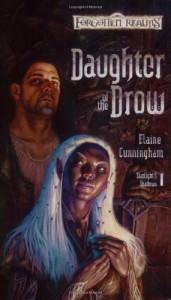 I haven't read the last volume in this series yet, but I liked the first two quite a bit. Stylistically, these books are above-average, and I think the female protagonist in particular is well-rounded and developed. Plus, there's lots of neatly woven-in information about the drow, everyone's favorite race of decadent dark elfs.
I haven't read the last volume in this series yet, but I liked the first two quite a bit. Stylistically, these books are above-average, and I think the female protagonist in particular is well-rounded and developed. Plus, there's lots of neatly woven-in information about the drow, everyone's favorite race of decadent dark elfs.
The Sweet Far Thing (Gemma Doyle, Book 3)
 A bit flabby, and I'm not sure how I feel about the ending, but ultimately I liked it. Felicity Worthingon is probably one of my favorite fictional characters ever.
A bit flabby, and I'm not sure how I feel about the ending, but ultimately I liked it. Felicity Worthingon is probably one of my favorite fictional characters ever.
Deep Secret
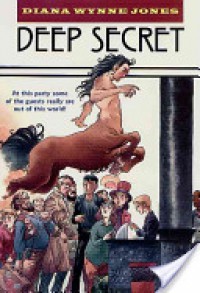 I love everything I read by this woman, and this book was no exception. Her characters are just so eminently likable, even when they're described as prats. This book also has one of my favorite and little-used premises, which is the notion of actual fantastical events happening to groups of fantasy enthusiasts (the bulk of the book takes place at an sf/f convention).
I love everything I read by this woman, and this book was no exception. Her characters are just so eminently likable, even when they're described as prats. This book also has one of my favorite and little-used premises, which is the notion of actual fantastical events happening to groups of fantasy enthusiasts (the bulk of the book takes place at an sf/f convention).
Promise of the Witch-King (Forgotten Realms: The Sellswords, Book 2) (Bk. 2)
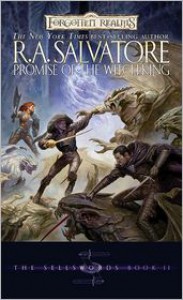 I tried reading this for my buddy's sake, but I don't think Salvatore is for me. A few scenes caught my interest, but for the most part I found the characters pretty insufferable & the writing bland and repetitive. Salvatore is good at writing action, but not so much interaction (see what I did there?).
I tried reading this for my buddy's sake, but I don't think Salvatore is for me. A few scenes caught my interest, but for the most part I found the characters pretty insufferable & the writing bland and repetitive. Salvatore is good at writing action, but not so much interaction (see what I did there?).










